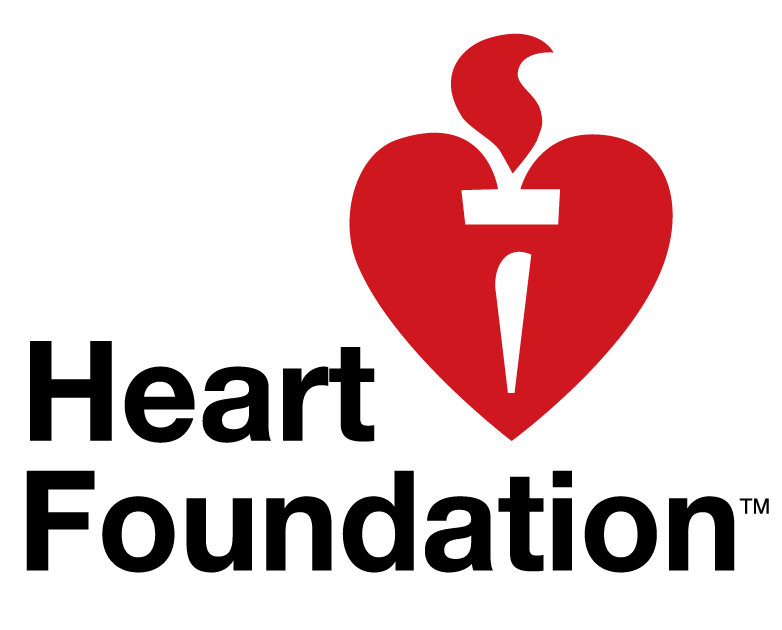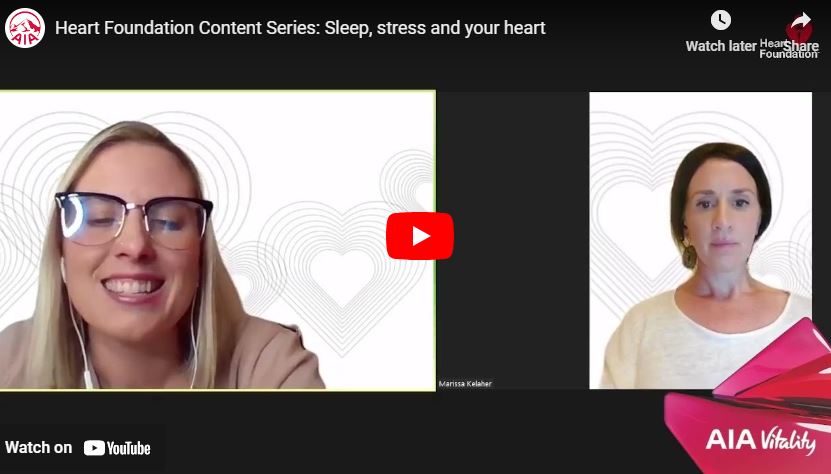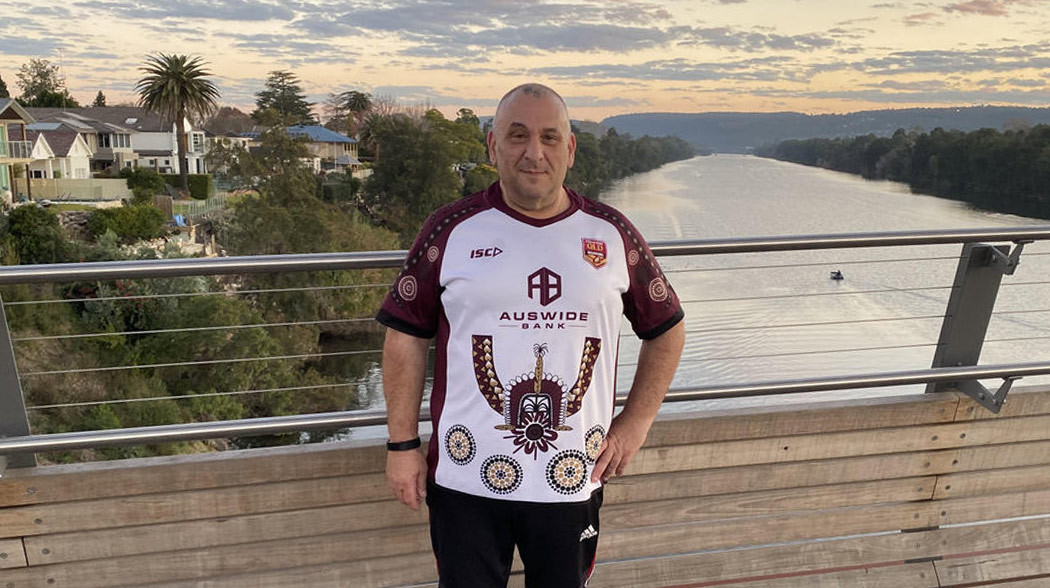As part of the Heart Foundation’s Heart Help Live series, GPs Dr Marissa Kelaher and Dr Taisia Cech (Your Lifestyle Medics) generously offered their insights on how stress, sleep and social connection can impact your heart.
They touched on how important it is to consider these things in order to keep your heart healthy, and took part in a Q&A session. You can watch the livestream here. We share below some of their top tips and insights:
Sleep
Getting enough sleep helps you to be at your best. If you’re getting less than 6 hours sleep each night, your heart will be negatively affected. For a healthy, happy heart, adults need at least 7 to 9 hours of sleep each night. Sleep plays an important role in regulating blood pressure, heart rate and hormones.
And while sleep deprivation can be a key factor in developing heart disease, getting too much sleep can also have a detrimental effect. If you sleep more than 10 hours a night, there’s an increased risk of developing high blood pressure, coronary artery disease and heart disease.
We also know that there’s a link to working long hours and having a short sleep duration. A recent study showed that people who work over 55 hours a week experienced sleep disturbances and had difficulty falling asleep. Additionally, there are links to increased cholesterol and inflammation in the body in people who don’t sleep enough, which are both major driving factors of heart conditions in general.
Another risk is to the impact on your immune system, which can be significantly weakened if you’re not getting enough sleep. People who are sleep deprived also tend to make much poorer food choices – overeating to get more calories, and going for less healthy foods that are high in saturated fats and sugar.
Marissa and Taisia’s top tips: “Sleep is the golden chain that holds it all together. During sleep your rest and digest nervous system kicks in - your heart rate decreases, your blood pressure drops, and although your heart is still pumping, it is also resting and being restored for the next day. Therefore, getting enough sleep is absolutely vital. Get into a good sleep routine by following these steps:
- Avoid alcohol and caffeine before bed
- Don’t eat sugary or salty foods at night
- Make sure your bedroom is like a safe haven with no distractions or devices
- Dim the lights before bed
- Try get natural light in the morning, and avoid all blue light at least an hour before sleep.
For more information check out How does sleep affect your heart? or Sleep Routines
Stress
Following the events of the last few years, stress is something we are all familiar with. We now all know what it’s like to live with insecurity and uncertainty in our everyday lives. However, our mental health is just as important as our physical health – especially when it comes to your heart.
There are two types of stress – acute and chronic.
You might experience acute stress when you’re running late to an appointment. This type of stress is generally not so bad. However, chronic stress is the type that doesn’t go away and can impact our lives and health in a big way.
When we’re living with chronic stress, our immune systems are compromised, and we are much more susceptible to infections. Chronic stress can also lead to inflammation and increased blood sugar and cortisol levels, all of which can have a significantly negative impact on our cardiovascular health.
You may not be surprised to learn that chronic stress can cause high blood pressure and an increased heart rate. But did you know that chronic stress can also lead to conditions like high cholesterol and heart arrhythmias, like atrial fibrillation?
Marissa and Taisia’s top tips: “Beware the ‘stress epidemic’. Prioritise stress management for your heart health and look at practical ways to reduce the stresses in your life. We talk about ‘stress resilience’ a lot – which means changing how stress affects us. There’s always going to be some stress in life but being mindful of what you spend your time on and trying not to fit too much in can be a big help. Take breaks during the day, get some fresh air and exercise, eat healthily, and just try to generally slow your day down instead of rushing into things. Even just a 10-minute walk out in nature can have a huge impact on lowering stress levels.”
For more information visit: Managing stress
Social connection
As humans, it’s important for us to lead fulfilling lives filled with purpose and meaning. Rather than just going through life on autopilot or charging through your day, it’s beneficial to reflect on a regular basis and do things that make you happy. Having strong and stable social connections is a huge part of this. Positive relationships can have a powerful influence on our health, and poor social relationships have been proven to increase the risk of heart disease and stroke.
You can improve your life expectancy, reduce your chances of inflammation, and even switch on anti-ageing genes simply by forging quality social connections. Having positive interactions activates your parasympathetic nervous system, which reduces potentially detrimental hormones in our bodies. This has a knock-on effect with physical changes such as decreasing your blood pressure and heart rate. Having a strong, stable social network around you is a great way to reduce stress.
Emotions play a huge role in our heart health, and social interactions are the most common source of producing feelings of happiness and self-worth. We know that when people are being sociable, they release hormones that protect the heart, such as oxytocin, serotonin and endorphins. On the flipside, if you’re socially isolated, you won’t be getting these beneficial natural protective barriers for your heart. People who are lonely are also more likely to smoke, drink alcohol and avoid exercise, which ican have an extremely negative effect on the risk of heart disease.
Marissa and Taisia’s top tips: “Forge meaningful connections by calling a friend to catch up instead of watching TV at night. Plan regular catchups with friends so that you get out during the week, and if you're short on time, try combining it something else at the same time, such as going for a walk. Join activities in your community or local gym, or volunteer to meet some new people. Prioritise time with your family and set aside other commitments that are starting to become stressful. And most importantly, don’t forget to smile and be kind! All of these small changes can have a massive impact on your heart health.”
For more information check out The power of social connection
Here's a short snippet of GPs Dr Marissa Kelaher and Dr Taisia Cech talking sleep, stress and your heart.
Meet the experts
Dr Marissa Kelaher and Dr Taisia Cech are both fully qualified practicing medical doctors and are registered with the New Zealand Medical Council. They work as General Practitioners but their passion is Lifestyle Medicine – using integrative evidence-based nutrition and lifestyle interventions to prevent, treat and reverse disease. Through their Lifestyle Medicine clinics, they are blown away every day by the changes that occur when people implement simple holistic nutrition and lifestyle principles into their lives.

Brought to you by AIA Vitality partner Heart Foundation.
The Heart Foundation is New Zealand’s heart charity, leading the fight against our country’s single biggest killer – heart disease. They rely on the generosity and goodwill of people like you to support their work.
AIA Vitality members can donate active rewards to Heart Foundation. Learn more here.







